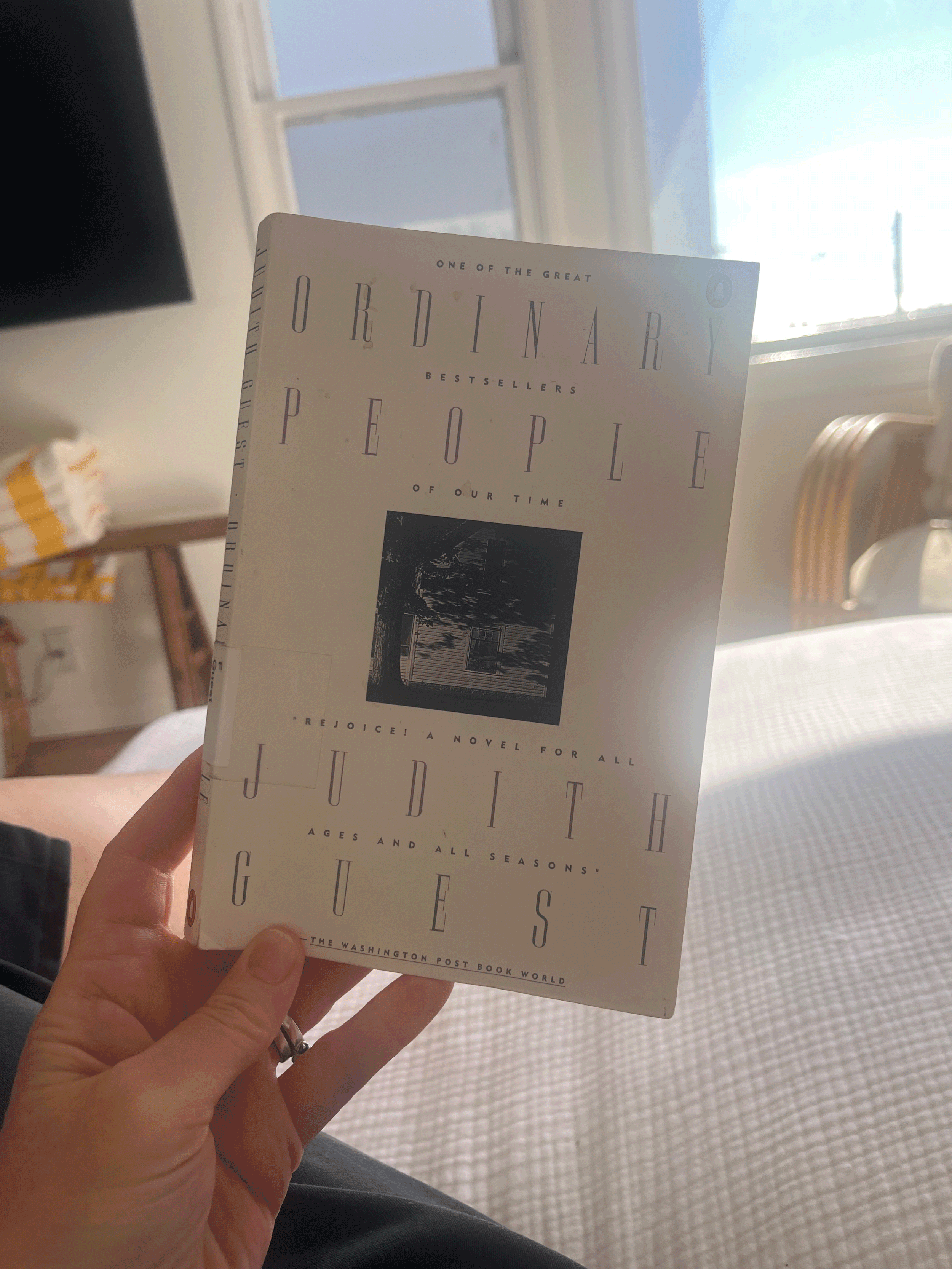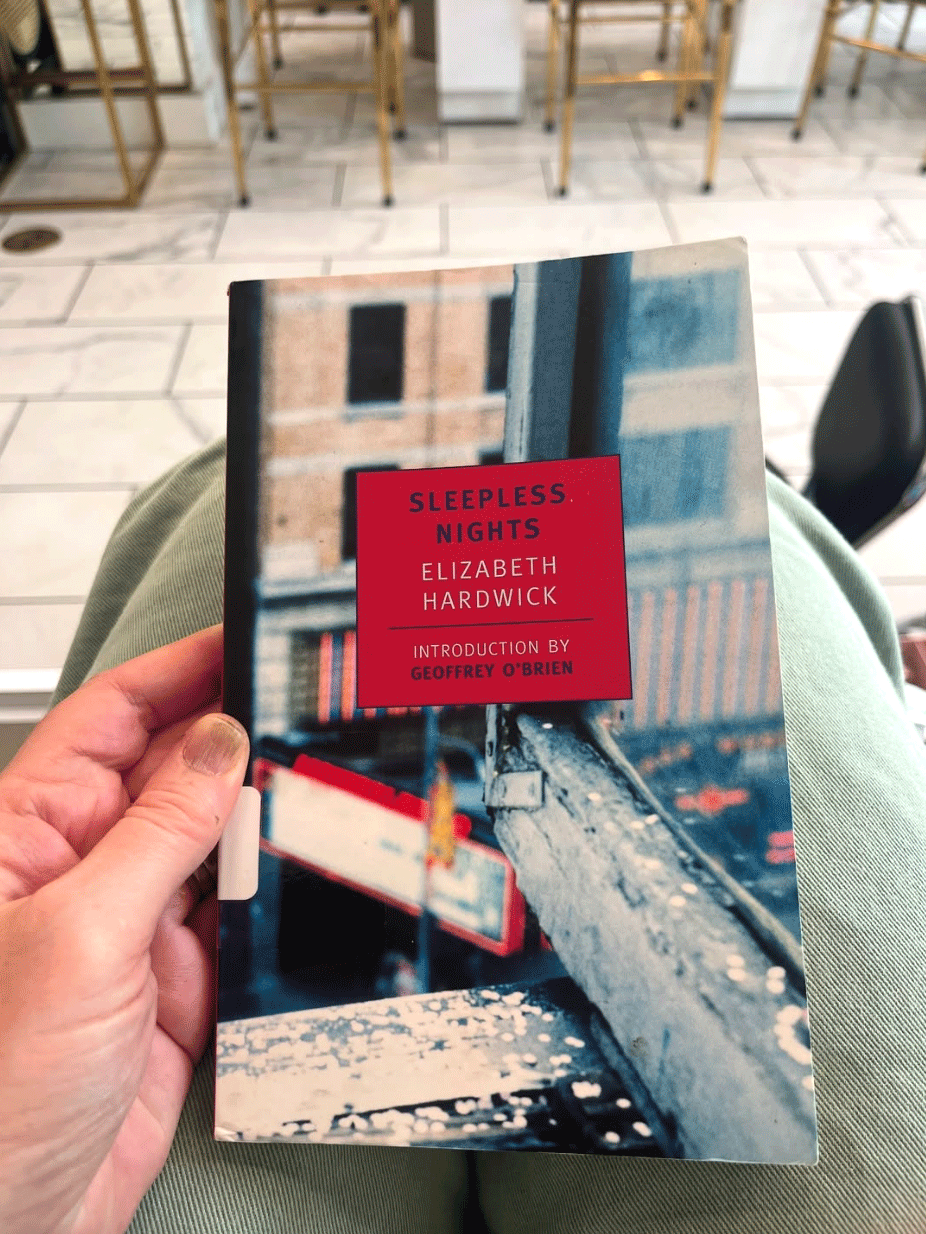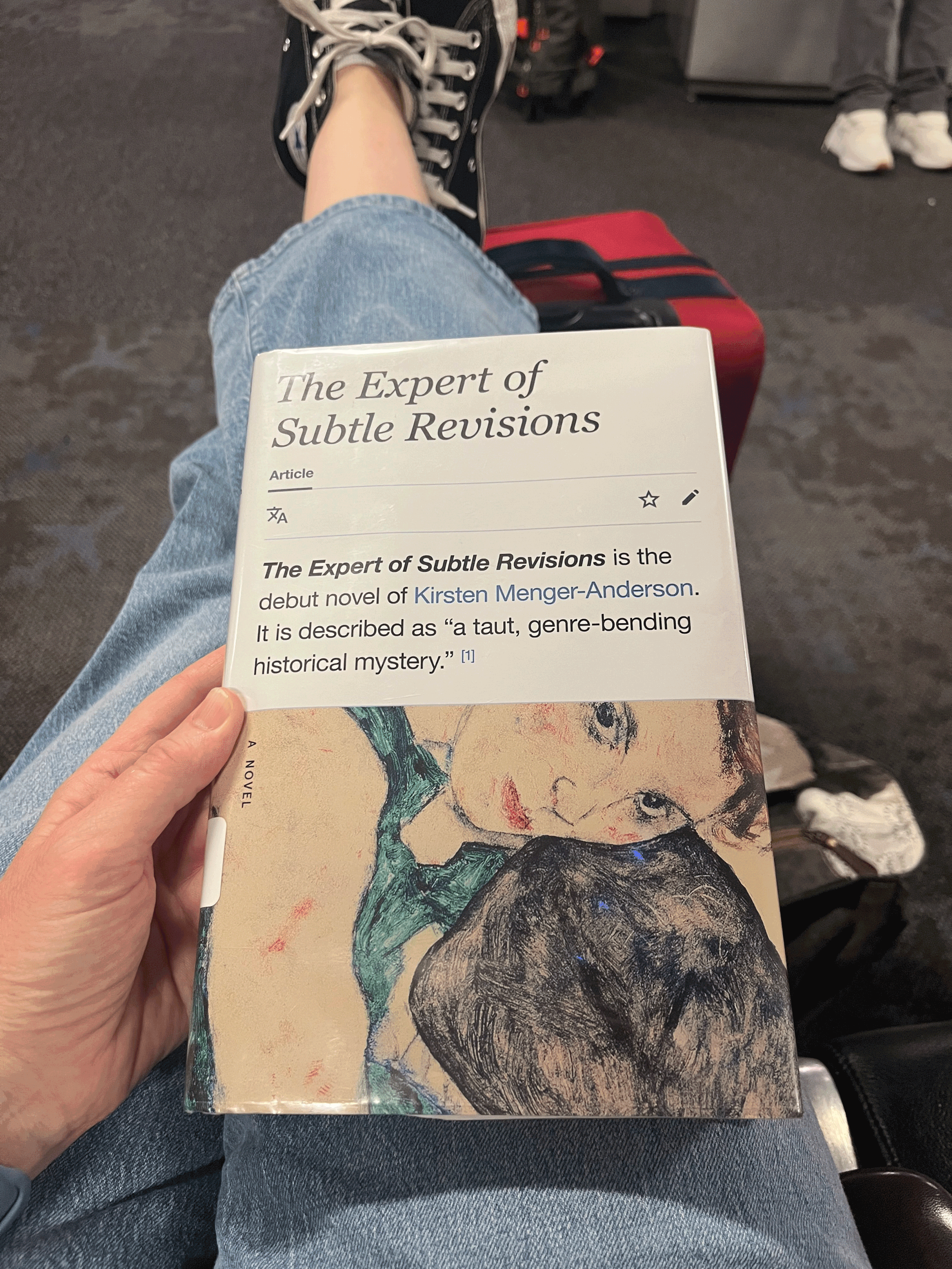
READ ALL ABOUT IT
Since 2012, I’ve been writing about books. And the act of reading. And the importance of story and narrative. But, mostly, the underlying theme of all I write is how taking a moment to stop and digest some longform text — instead of scrolling, instead of watching a video, instead of multitasking — can be one of the most grounding things we can do for ourselves. Here’s the one-stop online home for all this writing.
You can read more about me and my work by moseying over here. Want to peruse periodic “essay drops” — excerpts from my work-in-progress essay collection about Homesickness? Here ya go.

Ordinary People
A novel that reads like a play that was, actually, made into an extremely popular movie directed by Robert Redford…

Orbital
Something I think about — way too much probably — is whether or not it is possible to live in a vacuum. (Not saying I want to! Just that I find it sort of fascinating, speaking as someone who has lived in many different places.) How much, and to what degree, do our contexts and cultures influence the core of our beings?

Sleepless Nights
Just this morning, I explained to someone my “geographic trajectory” (let’s abbreviate it to “GT” to be cozy about it, although to be clear, I’m not referring to a cozy G&T), and it kind of blew her mind. Not because my GT — the “I’ve lived here” version of push-pins on a map — is so amazing or unique, but because she just had no idea. Basically: “How’d you end up here?” And further, “I’ve never been remotely near where you’re from.”

The Expert of Subtle Revisions
Do you *exist* if no one knows about you? Well, of course you do; this “tree falls in the woods” thought experiment doesn’t really hold up because — at minimum — the vast majority of us are “known” to the government or whatever else powers-that-be by virtue of having an ID, property record/lease, an internet connection, etc. But of course “knowing about you” the way that I mean isn’t about facts necessarily. It’s about feeling. And I just finished The Good Life, the book that outlines and gives insight into the Harvard Study of Adult Development, i.e. “the world’s longest scientific study of happiness.”

Jane and Prudence
I checked out this novel — Jane and Prudence by Barbara Pym — after reading about the late British novelist somewhere. It was entertaining — I think Pym is maybe regarded as a 20th-century Jane Austen, i.e. an author who liked to pierce uptight social norms? Jane and Prudence follows two friends as one (Jane) embarks on a new life after her husband, a clergyman, moves to a country congregation, and the other (Prudence) relishes in her mantle as city career gal. It was published in 1953. Busybody-ness reigns supreme, and it was an easy, delightful read.

Moon Tiger
Once in a while, I’ll come across a video of an over-the-top church service. The latest is a pastor making his “stage entrance” via makeshift rollercoaster. Okaaay! Welcome to the commodification of something sacred. “Commodifying” something is maybe just another way of saying “treating as a finite good” or perhaps “cheapening something into a more digestible state.”

Stone Yard Devotional
“Human beings need recognition as much as they need food and water. No crueler punishment can be devised than to not see someone, to render them unimportant or invisible. ‘The worst sin towards our fellow creatures is not to hate them,’ George Bernard Shaw wrote, ‘but to be indifferent to them: that’s the essence of inhumanity.’ To do that is to say: You don’t matter. You don’t exist.” This is from David Brooks’ book How to Know a Person: The Art of Seeing Others Deeply and Being Deeply Seen. Whether or not you like Brooks, it’s fair to say he can address a topic with ease and clarity; I found this one — which zeros in on something I think about quite often — an excellent read.
But what happens when someone seems to be actively eschewing being known? Or, how about this: What if by hiding oneself away a person may actually be more known? Does visibility = being “known”? Or is it something more? …

The Fell
There’s a difference between isolation, “alone time,” and loneliness. Maybe they intersect a bit, but the distinct ways that we experience — and perhaps sometimes crave — solitude don’t really share qualities, beyond the obvious granular one, with each other.

Dayswork
Some real literary figures feature in Dayswork, a novel by Chris Bachelder and Jennifer Habel (who are married to each other). Namely, Herman Melville, but also Nathaniel Hawthorne, Robert Lowell, literary critic Elizabeth Hardwick, and the still-living and Pulitzer-winning Melville biographer Hershel Parker (thinly veiled as “The Biographer”). They aren’t characters, exactly, as they play the historical figures that they actually are only through the lens of the protagonist’s internet deep dive as she becomes obsessed with Melville during the early days of the pandemic — that time when we were all sequestered inside with our computers as our only tethers to the outside world.

A Gate at the Stairs
I’ve finished this book and it nonetheless remains a mystery to me — and that is probably why I love it so, so much.

Same As It Ever Was
Something that I don’t think is talked about enough is the role of “admiration” in relationships. Often — if not always — the people we feel the most drawn to, the people who become the closest of friends, the people that we just feel good around … possess qualities that we admire and that we want to (even if just on a small level) try to emulate and replicate. Not in a creepy SWF stalker way, but in a gently magnetic way.

Pearl
I finished Siân Hughes’ Booker long-listed debut novel early this morning after getting about 3 hours of sleep (oy), and the slog sped up and her vision became clear.

Scaffolding
I wanted to say that this book hurt my feelings, with (what I thought was) that Nora Ephron phrase in mind. But actually, it turns out that the Nora Ephron book I was thinking about is called I Feel Bad About My Neck (and not something like My Neck Hurt My Feelings), so maybe I should say that I Feel Bad About This Book. I know that this is just a matter of preference because this is how I felt while living in Brooklyn.

Colored Television
There’s a lot in this book that touched a nerve for me (namely, bouncing around rentals with young children due to affordability and/or landlord nastiness…been there, done that in NYC and Dublin) and there’s a lot that may touch a nerve for others that I can’t necessarily relate to (navigating different cultures as a biracial person)…

Margo’s Got Money Troubles
Margo’s Got Money Troubles…people adore it. Apple is adapting it for TV. The gist: Margo is a 19-year-old community college student who gets pregnant by a professor. She decides to keep the baby. Yes, it’s a take on power and how people — particularly young ones — can find themselves in tough situations, yadda yadda. The aforementioned analysis is very true, but it’s sort of like saying this about a book: “It’s trying to say that everyone is equal.” Or, “We should love each other.” We know!!! (Or rather: Most of us know.)

Tell Me Everything
Oh, this one just might be my favorite. It likely isn’t most people’s favorite Elizabeth Strout novel (too many good ones to choose from!) — and pretty sure I wouldn’t recommend Tell Me Everything as anyone’s first foray into Strout’s catalog — but I think this is still my favorite.

The Safekeep
People will say The Safekeep is a love story, or people will say The Safekeep is about how WWII affected a country, but the magic of Yael van der Wouden’s debut is a house and how a structure’s story changes depending on who occupies it. A structure will always = shelter, but is this shelter fair, just, or healthy? “Bound to this house, he said. As if it was a tether and not a shelter.”

Ghost Wall
“Packs a punch.” “Good things come in small packages.” “Punches above its weight.” (Weird how ‘punch’ does double time when it comes to idioms about outsize force relative to size…guess we really do think of impact vis a vis mass?) Those are a handful of annoying phrases that one could use to describe a “small but mighty” (ugh) book. “Slim.” “Compact.” “Trim.” “Slender.” All ways that short novels are described. (No shame there — I’ve used them all.)

Creation Lake
It’s like when you’re sitting in a window-filled room and the clouds start moving juuust a smidge so that when the sunlight peeks and then recedes you nonetheless feel your entire mood fluctuate with these subtlest of shifts. Quietly provocative.

The Ease I Feel
“And so the days pass. I keep waiting for something to happen, for the ease I feel to end.” These are the words that Claire Keegan gives to the narrator — a young Irish girl sent to live with distant relatives — in Foster. The girl is in the middle of a gaggle of siblings, and the reader guesses that it is the imminent arrival of yet another baby that prompts the girl’s migration from a chaotic home with hints of trouble to the tidy, childfree Kinsella home where she is told to “make [herself] at home.”

